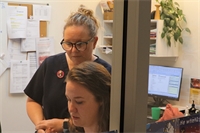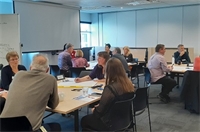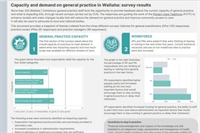18Dec
Challenges and solutions: Retaining the General Practice Workforce
A survey initiated by the CCN Primary Care Taskforce (PCTF) in June 2023 has revealed that more than fifty percent of Waitaha | Canterbury General Practitioners (GPs) and Practice Nurses (PNs) who responded to the survey, are planning to leave or retire from general practice in the next three to five years.
Following the survey completed by more than 200 general practice staff, the PCTF conducted interviews and focus groups with more than 30 participants to delve deeper into the issues influencing their decision to leave.
Chair of the PCTF, Dr Kim Burgess, says the PCTF appreciates the detailed responses to the survey and very candid discussions in focus groups, because it provides an opportunity to identify and progress positive changes that will help GPs and NPs contribute to general practice for longer.
This research uncovered a variety of reasons behind clinicians considering leaving general practice. These include heightened administrative burdens, lack of pay parity compared to secondary care colleagues, escalating stress levels, not receiving enough clinical support, an increase in patients with complex needs and changing patient expectations.
A PN expressed, “[I’m] losing satisfaction in a nursing role with the increased workload in non-patient contact. [I need] less time spent on phone trying to find appointments that aren't available.”
A GP shared, "I personally don't feel the hourly pay reflects the high stress and level of responsibility required in the job…."
However, some GPs talked of ‘the fun of general practice’ saying that it was ‘the best job in the world.’ Contributing to this were the long-standing relationships with patients, positive relationships with the general practice team, collegiality, variety of work, and the problem-solving aspect of being a GP.
Practitioners expressed a desire for part-time options, the pursuit of special interests (e.g., GPs with surgical experience doing minor surgeries in practice), and a deep commitment to patients, teams, vocation, and community. In response, the PCTF is working on the following:
- Administration: Introducing a 'kete' or basket of knowledge to assist practice teams manage their clinical inboxes more efficiently.
- Clinical support: Encouraging increased support for early career GPs through mentorship.
- Wellbeing and resilience: Advocating for greater access to wellbeing support.
- Part-time options: Enhancing visibility of flexible work options for GPs.
- Pay Parity: Sharing information gathered with organisations advocating for primary care.
- Strengthen workplace culture: providing practical advice to practices on ways to adopt a team approach.
"These challenges present an opportunity for collaborative solutions to ensure the continued dedication of our general practice workforce, fostering both professional fulfilment and community wellbeing," says Kim.
Read a summary of findings here and the full report here.
Go to the PCTF webpage for more information.
About the Author
Related

A Primary Care Taskforce was established earlier this year to lead local changes aimed at addressing...
Read More >

Long after the last patient has been seen, many general practitioners (GPs) and nurse practitioners ...
Read More >

A group of health system staff and health consumers are pooling their experience and knowledge to ad...
Read More >

More than 200 general practice staff from across Waitaha | Canterbury have shared their thoughts and...
Read More >

More than 200 general practice staff have taken the opportunity to provide feedback about the pressu...
Read More >
In a comprehensive survey conducted by the Canterbury Clinical Network’s Primary Care Taskforce (PC...
Read More >